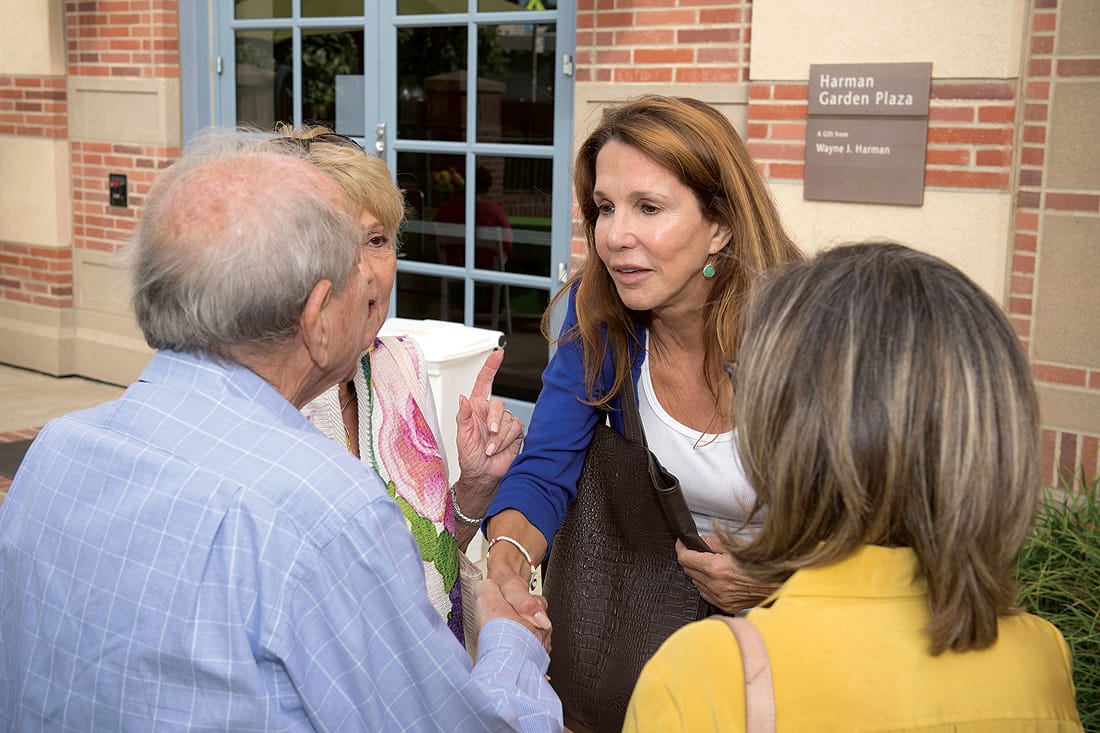
WILSHIRE BLVD — Supporters gathered at the Santa Monica-UCLA Medical Center Thursday to celebrate the one-year anniversary of a unique program that treats patients with dementia and Alzheimer's disease while backing up the people who care for them.
The UCLA Alzheimer's and Dementia Care program embraces not only the medical aspects of patient care, but also the mental health of the person suffering from the disease and their caregivers, often family that help them day in and day out.
It links families with medical care and community-based support services like adult day care and other programs that ensure the patient is getting comprehensive treatment that keeps them out of the hospital and even more expensive medical bills.
It also connects caregivers — be they family members of the patient or otherwise — with support groups coordinated by Patti Davis, the daughter of former President Ronald Reagan and long-time advocate for Alzheimer's care and research.
One year in, the program is already having a profound impact on the roughly 350 patients that have enrolled, said David Reuben, chief of the UCLA geriatrics division.
Reuben pointed to a patient that attended the event, Carole, as an example of its power.
Before enrolling in the program, Carole kicked, screamed and fired caregivers.
One of three dementia care managers in the program took her under her wing, and Carole began attending arts classes at an adult day care three days a week.
The care manager helped her caregiver identify and deal with symptoms, and worked with Reuben, the doctor, and Carole's psychiatrist to make sure the entire care team was pointed in the right direction.
"This lady, a year ago, was in a hospital," Reuben said. "Now she's laughing and smiling. It doesn't get any better than that."
Dementia is a general term for a decline in mental ability severe enough to interfere with daily life, and Alzheimer's is the most common form of that condition, according to the Alzheimer's Association, an organization that supports care, support and research into the disease.
Alzheimer's impacts an estimated 5.4 million people in the United States, and roughly 480,000 Californians, particularly the elderly. According to UCLA, nearly half of people 85 years of age and above will suffer from the disease.
Alzheimer's symptoms include difficulty remembering new information, and can lead to mood and behavior changes, confusion about time and events, suspicions of family members and even difficulty speaking, walking or swallowing.
While the impact on the patient is severe and often debilitating, it also has a huge effect on the person that helps the patient through daily activities, many of which can be unusually challenging.
That takes a toll on people, something Davis can speak to from experience.
Davis watched her father decline in a time that Alzheimer's and dementia barely received discussion, much less press. That left many people struggling with a situation beyond their control without the benefit of help or even a listening ear.
"They probably don't realize how stressful the situation is on caregivers," Davis said. "Statistically, caregivers will die before the person with Alzheimer's or dementia because of the stress of what they're going through."
Davis' experience led her to work with the UCLA Reagan Medical Center in Westwood to create a support group for caregivers that later shifted to the Santa Monica UCLA campus.
She helps somewhere between 20 and 22 people when they can break away from their role as caregivers.
The ability to delve into the stresses of the disease helps the families, but it also helps Davis who is still working through some of the issues raised during her father's illness.
"I often feel that I get as much from it as other people," Davis said.
For those unable to make it to the Tuesday and Thursday night groups, UCLA is debuting a teleconference-style support group so that people can actually call in from their homes or other locations to talk out their problems.
Although a year has passed, the program and those involved still have a lot on the horizon to make it a success.
It received $3.3 million in funds from the federal government through the Patient Protection and Affordable Care Act because of its potential to increase quality of care and patient outcomes while decreasing cost, mainly by avoiding hospitalizations, Reuben said.
Other funding comes from payments for medical services and donations from Robert Draine, James and Carol Collins and Chip Goodman, according to Ted Braun, director of marketing and public relations for the UCLA Health System.
Still, it needs 1,000 participants and it has fewer than 400, Reuben said.
The program has also run into challenges in coordinating the different groups that provide care to a single patient.
The UCLA team thought it would be a simple task to get computer software that could keep patient care information in one spot, but it apparently doesn't exist and costs hundreds of thousands of dollars to create.
Reuben produced a photo of a yellow legal pad with notes about calls received and returned that belongs to one of the dementia care managers.
"We can make e-mail referrals and phone call referrals, but there are no tracking mechanisms," he said.
Still, he has a lot of confidence that the program can succeed, and the patients with it.
"I won't say that we didn't' know what we were doing, but we've learned a lot," Reuben said.
ashley@www.smdp.com

